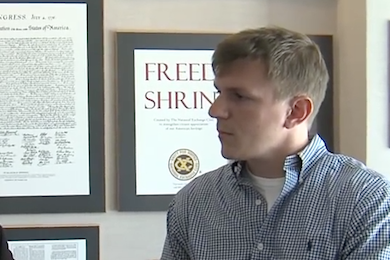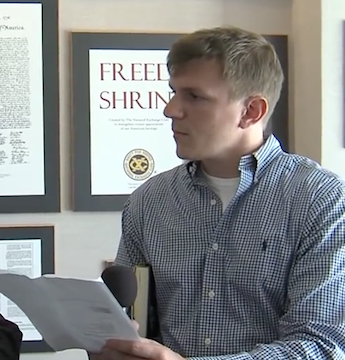
Pleading Guilty To Misdemeanor
The charge was associated with O'Keefe's January 25, 2010 entry to the Hale Boggs Federal Building in New Orleans. However, O'Keefe presented his legal I.D. to the guard and never was asked, or did he tell anyone why he was in the building. In the office of Sen. Mary Landrieu (D.-La.), a staffer asked if he could be helped, and he said he was waiting for
a friend.
O'Keefe's role was to stay back and videotape as two undercover investigators, wearing hard hats and reflector vests, checked the phones to see if they were genuinely jammed or not functioning as Landrieu told a Louisiana newspaper after she was asked why constituents calling to ask her to oppose Obamacare could not get through.
O’Keefe was in regular clothes, not in a disguise nor costume, that would have given anyone a false sense of his identity. His only device was a video camera made to look like a cellphone.
There was no pleading down from a felony to a misdemeanor charge. Although it was a misdemeanor charge, it was assigned to Judge Stanwood R. Duval; an unusual step made more unusual when Duval said the crime was an "unconscionable" deception with "extremely serious and may have lasting ramifications." The judge also alluded to similar acts that led to the deaths of federal officers.
In the agreement between O'Keefe and the Justice Department filed with the court D.O.J. specifically said there was no felony nor the attempt of a felony:
"In this case, further investigation did not uncover evidence that the defendants intended to commit any felony after entry by false pretenses despite their initial statements to the staff of the Senatorial office and G.S.A. requesting access to the central phone system. Instead, the government's evidence would show that the defendants misrepresented themselves and their purpose for gaining access to the central phone system to orchestrate a conversation about phone calls to the Senator's staff and capture the conversation on video, not to actually tamper with the phone system, or to commit any other felony."
Before his arrest, O’Keefe showed his video footage to a local attorney, who assured him there was nothing illegal what he did. Upon his arrest, federal officers seized his cellphone-like video camera. When O'Keefe's attorney finally succeeded in getting the camera returned to O'Keefe, the videos were deleted.
Faced with a hostile judge and his exculpatory evidence deleted, O'Keefe pleaded guilty to a misdemeanor, accepted a three-year probation, and paid a $1,500 fine.
More than a decade later, the mistake of pleading guilty to the misdemeanor is still misreported or blown up as evidence of his criminal past. In his 2013 book Breakthrough, O’Keefe wrote:
Had we gone to trial, the prosecution would have had to argue that I committed a crime by telling the Landrieu staffers I was waiting for someone when I really wasn’t. It was for this innocuous act, in fact, that the federal government would harass me for the next three years.
About Project Veritas
Project Veritas is a non-profit investigative news organization conducting undercover reporting. Project Veritas investigates and exposes corruption, dishonesty, self-dealing, waste, fraud, and other misconduct in both public and private institutions to achieve a more ethical and transparent society. Project Veritas is a registered 501(c)(3) organization.
